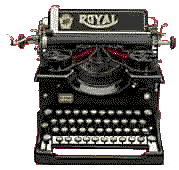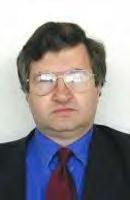| ||
Unless correspondents ask us not to, this Website will post selected letters that it receives and invite open debate. |
Marie
Miller
of
Connecticut, USA, writes on Wednesday, September 26, 2001

I need pointers on Historiography
I HAVE been hesitant to write you because I do not know if you will actually respond to the questions I have for you. I realize that you are busy on your book tour, but I am curious about your works and would like to get a broader perspective on your ideology than what I have been recently been presented with.
 I
am a budding historian attending school in Connecticut
and we were assigned "Lying about Hitler" by Richard
Evans, a work that you may be familiar with. Despite
Evan's view of your work, I found myself intrigued by
your method of historiography. It is quite different from
what we are taught..and I know that you do not have a
formal (in the Oxford Ph.D sense) background in the field
of history, you were quoted as saying that history was
the only subject in school that you failed.
I
am a budding historian attending school in Connecticut
and we were assigned "Lying about Hitler" by Richard
Evans, a work that you may be familiar with. Despite
Evan's view of your work, I found myself intrigued by
your method of historiography. It is quite different from
what we are taught..and I know that you do not have a
formal (in the Oxford Ph.D sense) background in the field
of history, you were quoted as saying that history was
the only subject in school that you failed.
At any rate, you take an interesting approach and breach interesting questions about the way historical documents should be read and interpreted. I have several major research papers to write this semester and I am wondering if you can give me any pointers as to how I should approach the subject of history as you have changed my perspective of it greatly.
Thank you for your time and I hope to hear from you soon.
David Irving replies:
OKAY, Marie, hear goes. First let me draw your attention to our dossier on the Cambridge scholar, Prof. Richard Evans.
I am surprised, but then again I am not, to hear that
classes in the USA are now being assigned books like
Lying about Hitler to study. I thought that dubious
honour belonged to the Lipstadt masterpiece, Denying the
Holocaust.  But
the usual forces around the world are at work to promote
the Evans book -- it is just coming out in Germany, to
rave advance reviews on amazon.de
[Der
Geschichtsfälscher. Holocaust und historische
Wahrheit im David-Irving-Prozess. von Richard
Evans]; and check his rave reviews in the U.K.
(where the book is not available!): Telling
Lies About Hitler, by Richard Evans, by Paperback -- 400
pages (27 May, 2002) Basic Books; ISBN:
0465021530.
But
the usual forces around the world are at work to promote
the Evans book -- it is just coming out in Germany, to
rave advance reviews on amazon.de
[Der
Geschichtsfälscher. Holocaust und historische
Wahrheit im David-Irving-Prozess. von Richard
Evans]; and check his rave reviews in the U.K.
(where the book is not available!): Telling
Lies About Hitler, by Richard Evans, by Paperback -- 400
pages (27 May, 2002) Basic Books; ISBN:
0465021530.
Which is a puzzle: As you probably know, the Evans book is considered by even Prof. Evans' own U.K. publishers, the respectable Jewish firm of William Heinemann Ltd., to be so libellous (i.e., defamatory and untrue) that they have torn up their contract and refused to publish it in England. U.S. firms, which are protected by the New York Times vs. Sullivan precedent, find no such compunctions, and will print almost anything: One glance at the headlines on the covers of the publications next to your local K-Mart or Walmart checkout will confirm that to you. For Elvis, write Evans, and you will see what I mean.
He is what I call a conformist historian, of whom there are legion. Thousands of "scholars," who contribute not one whit of original research or discovery or documentation to the world of historiography, but sit in their classrooms droning on to unfortunates like yourself; or retire to their book-lined caves to pluck a (printed) work off the shelves, which they then quote -- and then they preen and pride themselves on the depth of their research.
 Evans
is a flat, dull, boring, venal, corrupt conformist who
willingly sold his soul to the Devil and will be forced
to keep his part of the Faustian pledge for the rest of
his life; while I am at liberty to write what I want,
inspired by the knowledge that there will always be free
souls and spirits like yourself out there who are keen to
get to the bottom of things, because not even the Evanses
of this world have succeeded in destroying your natural
curiosity and idealism.
Evans
is a flat, dull, boring, venal, corrupt conformist who
willingly sold his soul to the Devil and will be forced
to keep his part of the Faustian pledge for the rest of
his life; while I am at liberty to write what I want,
inspired by the knowledge that there will always be free
souls and spirits like yourself out there who are keen to
get to the bottom of things, because not even the Evanses
of this world have succeeded in destroying your natural
curiosity and idealism.
I write Real History, and I don't care whom I offend in the process. As Winston Churchill once said, "The job of the historian is to find out What Happened and Why."
If you get a copy of my latest work, Churchill's War, vol. ii, you will find that on the back cover is a simple explanation of what I mean by Real History. Four linked pictures: Anthony Eden, British foreign secretary (and later, prime minister); a document he wrote (and censored); an author, myself; and a page of the resulting manuscript and book. You get the point? No academic prejudice, no political input, just history. Straight from the history-maker to the reader, yourself.
Having written the history in draft, relying to the utmost on original documents (i.e., archives, in Britain, USA, and around the world: from many of which countries I am now alas banned, thanks to the efforts of the conformists!) I then revise the book, using the tools of the novelist, carefully working on tempo (sentence and paragraph length), mood, and drama, and generally sustaining the interest of the reader. None of the veracity is lost, but the readability is enhanced.
Each page must have something -- a revelation, or a quip perhaps -- which makes Marie Miller want to turn the page and read on. At the end of each chapter I face up to the big challenge: How to make her resist the urge to lay the book aside and go out to Dunkin' Donuts, but to turn to the first page of the next chapter instead? Now, that is an art, and I have been working on it for forty years.
Finally, the thing that makes my historiography different is the ability to Think Different (if I can steal the Macintosh slogan). Dump the reading list your professor gave you! Compile your own list! Do not believe everything you are told: Search for alternatives -- different explanations as to what happened and why. Unfortunately, history is seldom clear cut: there are always loose ends and intangibles, inexplicables, imponderables.
That's what makes it fun to research and to write. If you become an historian yourself, you'll find it opens great avenues of excitement: you ring front-door bells, and say, "Can I speak with you, I want to put your name into history?" (But before you do, read up the subject first, so that you know more about it than the guy who answers that front door. That sounds obvious, but it is the way to make him talk, and even come clean.)
Evans does none of these things. He is famous only because he accepted a quarter-million dollar payment from a firm of lawyers to testify against me as a "neutral" in the Lipstadt case. You can form your own impression, thanks to his own book, as to how neutral he was.
Asked, under cross examination, why famous historians
like Gordon Craig, Trevor-Roper, A J P Taylor, Captain
Stephen Roskill, Francis Loewenstein, and others have
uniformly praised my works, he dismissed them all as
negligent and ignorant (he had no choice).  This
Bear of Little Brain, who was one of the most unpopular
professors at his former English university, East Anglia,
squirted poisonous bile over every such name, and yet he
wonders now why his icon on my website is a skunk.
This
Bear of Little Brain, who was one of the most unpopular
professors at his former English university, East Anglia,
squirted poisonous bile over every such name, and yet he
wonders now why his icon on my website is a skunk.
Related item on this website:
 Dossier
on Prof. Richard Evans
Dossier
on Prof. Richard Evans The Guardian"Top
historian's work rejected amid libel fears finds new
home"
The Guardian"Top
historian's work rejected amid libel fears finds new
home" David
Irving writes to The Spectator about Evans
David
Irving writes to The Spectator about Evans
Now read how Prof. Evans twists and squirms under cross-examination:
